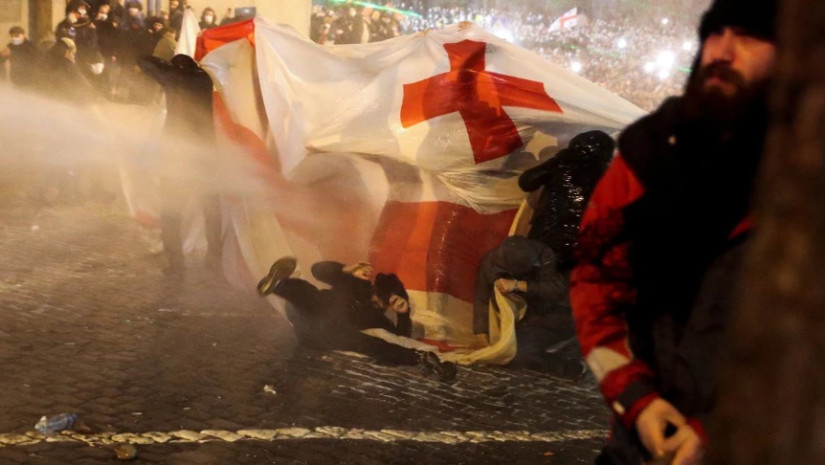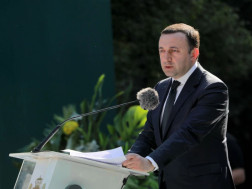The world media has echoed the last night’s developments in Tbilisi. Georgian Parliament on Tuesday approved the proposed legislation On the Transparency of Foreign Influence in its first reading, followed by a street protest outside, where police fired water cannons and tear gas at demonstrators.
Accoridng to Washington Post, the law, which has received initial approval, would require media outlets and nongovernmental organizations that receive more than 20% of their funding from foreign sources to register as “agents of foreign influence.” International organizations have voiced concern over the draft law, saying it runs against Georgia’s democratic development.
"Thousands of people have been massing for days in Tbilisi to protest the proposed law, and a fight broke out at one point among lawmakers. A police statement said several law enforcement officers have been injured. Protesters have also reported injuries. While Georgia’s president, Salome Zurabishvili, has said she would veto the bill, its authors say it’s needed for the transparency of the work of entities financed by representatives of foreign states. Parliament can override presidential vetoes. In a video she shot with New York’s Statue of Liberty visible in the background, Zurabishvili supported the protesters", - Washington Post reported.
According to CNN, protests erupted in Tbilisi on Tuesday after Georgia’s parliament passed the first reading of a controversial draft law that would require some organizations receiving foreign funding to register as “foreign agents.” Rights groups have criticized the law as curtailing basic freedoms in the country. The court session was broadcast live on the legislature’s website.
“The bill must pass further readings in parliament to become law, but so far appears to have broad support among Georgian lawmakers despite criticism domestically and abroad", - CNN reported.
According to Reuters, police in the centre of the capital Tbilisi used water cannon and tear gas in attempt to disperse thousands of demonstrators, who fear the draft law could hurt the South Caucasus country's hopes of European Union membership.
"Georgia's government has in recent years faced criticism from observers, who say the country is drifting towards authoritarianism. In June, the EU declined to grant Georgia candidate status alongside Moldova and Ukraine, citing stalled political and judicial reforms," Reuters reports.
According to the BBC, protesters have clashed with police in Georgia's capital, Tbilisi, after parliament backed a controversial draft law which critics say limits press freedom and suppresses civil society.
"Riot police used water cannon and pepper spray to disperse the crowds outside the parliament building. Some protesters were seen falling on the ground and coughing, while others waved EU and Georgian flags.
What most protesters and the country's opposition fear is that the adoption of the law would mark an end to Georgia's long-standing ambition to join the EU. More than 80% of Georgia's population supports Georgia's European perspective, which is also enshrined in the country's constitution," the BBC reports.
According to the Guardian, some of the protesters gathered outside the Parliament building carried Georgian, EU and US flags, and shouted: “No to the Russian law,” and “You are Russian” at politicians inside the legislature.
“Russia is viewed as an enemy by many Georgians, after Moscow backed separatists in the breakaway Georgian regions of Abkhazia and South Ossetia in the 1990s. Hundreds of thousands of Georgians remain internally displaced within the country after several bouts of bloody ethnic conflict”.
Georgian authorities are backing a "foreign agent" bill despite criticism from Brussels and Washington. The bill is widely seen as emulating a repressive Russian law that allows the Kremlin to crush its critics, Deutche Welle reports.
“The rising anti-Western narratives promulgated by the Georgian government and its refusal to join international sanctions against Russia after the invasion of Ukraine give the impression that Georgia is drifting into the Russian orbit”.
The Georgian Parliament adopted the People’s Power-tabled draft bill on Transparency of Foreign Influence in its first reading, with 76 votes in favour and 13 against on March 7.
















